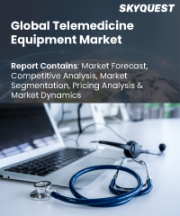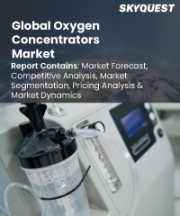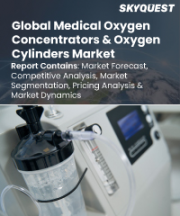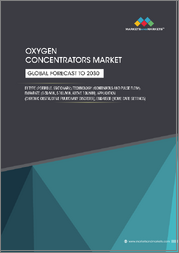
|
시장보고서
상품코드
1785215
산소발생기 시장 - 산업 규모, 점유율, 동향, 기회, 예측, 유형별, 기술별, 유량별, 용도별, 최종 사용자별, 지역별, 경쟁(2020-2030년)Oxygen Concentrators Market - Global Industry Size, Share, Trends, Opportunity & Forecast, Segmented By Type Technology, By Flowrate, By Application, By End Users, By Region & Competition, 2020-2030F |
||||||
산소발생기 세계 시장 규모는 2024년에 38억 2,000만 달러로 평가되었고, 2030년에는 63억 2,000만 달러에 이르고, CAGR 8.72%로 성장할 것으로 예측되고 있습니다.
산소발생기는 혈중 산소 농도가 낮은 환자를 지원하는 의료기기의 중요한 구성 요소입니다. 그 목적은 대기보다 더 높은 농도의 산소를 환자에게 보충하는 것입니다. 이 장비는 공기를 받고 정화하고 환자에게 공급합니다. 산소발생기의 조작은 간단하고 이해하기 쉽습니다. 산소발생기는 편의성, 휴대성, 안전성, 컴팩트성, 비용 효율적이며 심장 발작 및 호흡기 질환의 위험을 줄이는 데 기여합니다. 게다가 정신적인 명확성과 전반적인 기분 개선을 촉진합니다.
| 시장 개요 | |
|---|---|
| 예측 기간 | 2026-2030년 |
| 시장 규모 : 2024년 | 38억 2,000만 달러 |
| 시장 규모 : 2030년 | 63억 2,000만 달러 |
| CAGR 2025-2030년 | 8.72% |
| 급성장 부문 | 휴대용 |
| 최대 시장 | 북미 |
산소발생기는 경량성, 합리적인 가격 및 효능 향상으로 환자가 쉽게 이동할 수 있습니다. 산소발생기의 중요성은 환자의 라이프 스타일을 반영하는 세계 시장에서 분명합니다. 이러한 장비는 연속 흐름, 펄스 흐름 및 기타 유형으로 분류됩니다. 연속 흐름은 흡기 또는 호기 시에도 산소를 지속적으로 방출합니다. 펄스 흐름 장치는 흡입을 감지하고 그 순간에만 산소를 공급합니다. 펄스 흐름은 많은 사람들에게 적합하지만 특정 질병 상태를 가진 사람들에게는 적합하지 않을 수 있습니다.
주요 시장 성장 촉진요인
호흡기 질환 증가
주요 시장 과제
엄격한 정부 규칙
주요 시장 동향
만성 호흡기 질환의 유병률 증가
목차
제1장 개요
제2장 조사 방법
제3장 주요 요약
제4장 고객의 목소리
제5장 세계의 산소발생기 시장 전망
- 시장 규모와 예측
- 금액별
- 시장 점유율 및 예측
- 유형별(휴대용, 정치)
- 기술별(연속 플로우, 펄스 플로우, 연속/펄스 플로우)
- 유량별(0-5L/분, 5-10L/분, 10L/분 이상)
- 용도별(COPD, 폐암, 폐렴, COVID-19, 기타)
- 최종사용자별(병원 및 진료소, 외래 진료 센터, 재택 케어, 기타)
- 지역별
- 기업별(2024년)
- 시장 맵
제6장 북미의 산소발생기 시장 전망
- 시장 규모와 예측
- 시장 점유율 및 예측
- 북미 : 국가별 분석
- 미국
- 캐나다
- 멕시코
제7장 유럽의 산소발생기 시장 전망
- 시장 규모와 예측
- 시장 점유율 및 예측
- 유럽 : 국가별 분석
- 독일
- 영국
- 이탈리아
- 프랑스
- 스페인
제8장 아시아태평양의 산소발생기 시장 전망
- 시장 규모와 예측
- 시장 점유율 및 예측
- 아시아태평양 : 국가별 분석
- 중국
- 인도
- 일본
- 한국
- 호주
제9장 남미의 산소발생기 시장 전망
- 시장 규모와 예측
- 시장 점유율 및 예측
- 남미 : 국가별 분석
- 브라질
- 아르헨티나
- 콜롬비아
제10장 중동 및 아프리카의 산소발생기 시장 전망
- 시장 규모와 예측
- 시장 점유율 및 예측
- 중동 및 아프리카 : 국가별 분석
- 남아프리카
- 사우디아라비아
- 아랍에미리트(UAE)
제11장 시장 역학
- 성장 촉진요인
- 과제
제12장 시장 동향과 발전
- 최근 동향
- 제품 출시
- 합병과 인수
제13장 세계의 산소발생기 시장 : SWOT 분석
제14장 경쟁 구도
- Koninklijke Philips NV
- Invacare Corporation
- Teijin Limited
- Precision Medical, Inc.
- Drive DeVilbiss Healthcare LLC
- Nidek Medical Products Inc.
- Inogen Inc.
- NGK Spark Plug Co., Ltd.
- GCE Group
- Linde Healthcare
제15장 전략적 제안
제16장 기업 소개와 면책사항
SHW 25.08.13Global Oxygen Concentrators market was valued at USD 3.82 Billion in 2024 and is expected to reach USD 6.32 Billion by 2030 with a CAGR of 8.72%. A oxygen concentrators is a vital component of medical equipment that provides support to patients with low blood oxygen levels. Its purpose is to supply supplemental oxygen to patients, with a higher concentration than the atmosphere. This device receives air, purifies it, and delivers it to the patient. The operation of an oxygen concentrator is straightforward and easily understood. oxygen concentrators offer convenience, portability, safety, compactness, cost-effectiveness, and contribute to a reduced risk of heart attacks and respiratory illnesses. Furthermore, they promote improved mental clarity and overall mood.
| Market Overview | |
|---|---|
| Forecast Period | 2026-2030 |
| Market Size 2024 | USD 3.82 Billion |
| Market Size 2030 | USD 6.32 Billion |
| CAGR 2025-2030 | 8.72% |
| Fastest Growing Segment | Portable |
| Largest Market | North America |
Oxygen concentrators enable patients to travel with ease due to their lightweight nature, affordability, and enhanced efficacy. The significance of oxygen concentrators is evident in the global market, reflecting the lifestyle of patients. These devices are classified into continuous flow, pulse flow, and other types. Continuous flow units continuously emit oxygen, even during inhalation and exhalation. Pulse flow units detect inhalation and only deliver oxygen at that specific moment. While pulse dosages are suitable for many individuals, they may not be suitable for those with specific medical conditions.
Key Market Drivers
Rising Incidences of Respiratory Diseases
The growing number of individuals diagnosed with respiratory diseases, such as lung cancer, chronic obstructive pulmonary disease (COPD), asthma, pulmonary fibrosis, and influenza, highlights the urgent need for effective oxygen therapy solutions. Chronic respiratory diseases impact over 550 million adults globally and represent a leading cause of mortality and long-term disability. Pediatric populations are also significantly affected, with asthma identified as the most prevalent chronic condition among children, currently impacting approximately 14% of this demographic a figure that continues to grow. Over the past thirty years, the prevalence of chronic respiratory conditions has increased by an estimated 40%, underscoring a mounting public health challenge with substantial implications for healthcare systems worldwide. Oxygen concentrators offer a breakthrough in medical technology by providing a convenient and versatile option for delivering oxygen to patients. This empowers individuals to manage their respiratory conditions more effectively, ultimately enhancing their overall quality of life.
The rising incidences of respiratory diseases have led to an increased demand for POCs in the healthcare market. These innovative devices not only help patients receive the oxygen they need outside of the hospital setting but also enable healthcare providers to extend their care beyond traditional boundaries. By facilitating home-based oxygen therapy, POCs reduce the burden on healthcare facilities, ensuring that patients can receive continuous care in the comfort of their own homes.
In addition to the numerous benefits for patients and healthcare providers, POCs also present a cost-effective solution. Unlike traditional oxygen therapy methods, which often require frequent cylinder refills or maintenance of stationary concentrators, POCs eliminate these inconveniences. This not only saves time and resources but also ensures a seamless and uninterrupted oxygen supply for patients, leading to improved treatment outcomes.
With their portability, convenience, and cost-effectiveness, POCs are revolutionizing the field of respiratory care. By meeting the demand for effective oxygen therapy solutions, POCs are making a significant impact on the lives of individuals with respiratory diseases, offering them newfound freedom, independence, and improved well-being.
Key Market Challenges
Stringent Government Rules
The expansion of the medical device sector is being hindered by recent modifications to the FDA's approval process in several nations. These changes, which aim to ensure patient safety and product efficacy, have introduced additional complexities and hurdles that companies must navigate. As a result, the process of bringing innovative medical devices to market has become more challenging and time-consuming.
Moreover, the industry is not only grappling with regulatory obstacles but also facing a shortage of skilled specialists. The demand for experts in medical device development, manufacturing, and regulatory affairs far exceeds the available talent pool. This scarcity of skilled professionals further exacerbates the difficulties faced by companies in bringing their products to market efficiently. In addition, the limited understanding of advanced medical technologies among healthcare professionals and the general public poses a potential detriment to the industry's growth. It is crucial for both healthcare providers and patients to stay informed and educated about the latest advancements in medical devices to ensure their effective utilization and widespread adoption. The medical device sector is navigating through a complex landscape, with regulatory changes, talent shortages, and knowledge gaps posing significant challenges. Addressing these issues will be vital for the industry's sustained growth and the timely availability of innovative medical technologies to benefit patients worldwide.
Key Market Trends
Increasing Prevalence of Chronic Respiratory Diseases
The global market for oxygen concentrators is experiencing significant growth due to the increasing number of patients in need. According to the World Health Organization, chronic obstructive lung disease (COPD) ranks as the third leading cause of death, responsible for 3.23 million fatalities. Research indicates a rising prevalence of respiratory conditions, necessitating the use of oxygen for breathing. Furthermore, the market's expansion is fueled by the demand for long-term oxygen therapy (LTOT) and the growing number of asthma patients. In order to meet the needs of all patients requiring oxygen concentrators, there is an emphasis on providing accessible and affordable solutions, supported by favorable government initiatives. These factors together are driving the expansion of the market for oxygen concentrators, ensuring that patients receive the vital support they need for improved quality of life.
Key Market Players
- Koninklijke Philips N.V.
- Invacare Corporation
- Teijin Limited
- Precision Medical, Inc.
- Drive DeVilbiss Healthcare LLC
- Nidek Medical Products Inc.
- Inogen Inc.
- NGK Spark Plug Co., Ltd.
- GCE Group
- Linde Healthcare
Report Scope:
In this report, the Global Oxygen Concentrators Market has been segmented into the following categories, in addition to the industry trends which have also been detailed below:
Oxygen Concentrators Market, By Type:
- Portable
- Stationary
Oxygen Concentrators Market, By Technology:
- Continuous Flow
- Pulse Flow
- Continuous/Pulse Flow
Oxygen Concentrators Market, By Flow Rate:
- 0-5l/min
- 5-10l/min
- Above 10l/min
Oxygen Concentrators Market, By Application:
- COPD
- Lung Cancer
- Pneumonia
- COVID-19
- Others
Oxygen Concentrators Market, By End User:
- Hospitals & Clinics
- Ambulatory Care Centres
- Home Care
- Others
Oxygen Concentrators Market, By Region:
- North America
- United States
- Canada
- Mexico
- Europe
- France
- United Kingdom
- Italy
- Germany
- Spain
- Asia-Pacific
- China
- India
- Japan
- Australia
- South Korea
- South America
- Brazil
- Argentina
- Colombia
- Middle East & Africa
- South Africa
- Saudi Arabia
- UAE
Competitive Landscape
Company Profiles: Detailed analysis of the major companies present in the Global Oxygen Concentrators Market.
Available Customizations:
Global Oxygen Concentrators market report with the given market data, TechSci Research offers customizations according to a company's specific needs. The following customization options are available for the report:
Company Information
- Detailed analysis and profiling of additional market players (up to five).
Table of Contents
1. Product Overview
- 1.1. Market Definition
- 1.2. Scope of the Market
- 1.2.1. Markets Covered
- 1.2.2. Years Considered for Study
- 1.2.3. Key Market Segmentations
2. Research Methodology
- 2.1. Objective of the Study
- 2.2. Baseline Methodology
- 2.3. Key Industry Partners
- 2.4. Major Association and Secondary Sources
- 2.5. Forecasting Methodology
- 2.6. Data Triangulation & Validation
- 2.7. Assumptions and Limitations
3. Executive Summary
- 3.1. Overview of the Market
- 3.2. Overview of Key Market Segmentations
- 3.3. Overview of Key Market Players
- 3.4. Overview of Key Regions/Countries
- 3.5. Overview of Market Drivers, Challenges, Trends
4. Voice of Customer
5. Global Oxygen Concentrators Market Outlook
- 5.1. Market Size & Forecast
- 5.1.1. By Value
- 5.2. Market Share & Forecast
- 5.2.1. By Type (Portable, Stationary)
- 5.2.2. By Technology (Continuous Flow, Pulse Flow, Continuous/Pulse Flow)
- 5.2.3. By Flowrate (0-5l/min, 5-10l/min, Above 10l/min)
- 5.2.4. By Application (COPD, Lung Cancer, Pneumonia, COVID-19, Others)
- 5.2.5. By End Users (Hospitals & Clinics, Ambulatory Care Centres, Home Care, Others)
- 5.2.6. By Region
- 5.2.7. By Company (2024)
- 5.3. Market Map
6. North America Oxygen Concentrators Market Outlook
- 6.1. Market Size & Forecast
- 6.1.1. By Value
- 6.2. Market Share & Forecast
- 6.2.1. By Type
- 6.2.2. By Technology
- 6.2.3. By Flowrate
- 6.2.4. By Application
- 6.2.5. By End Users
- 6.2.6. By Country
- 6.3. North America: Country Analysis
- 6.3.1. United States Oxygen Concentrators Market Outlook
- 6.3.1.1. Market Size & Forecast
- 6.3.1.1.1. By Value
- 6.3.1.2. Market Share & Forecast
- 6.3.1.2.1. By Type
- 6.3.1.2.2. By Technology
- 6.3.1.2.3. By Flowrate
- 6.3.1.2.4. By Application
- 6.3.1.2.5. By End Users
- 6.3.1.1. Market Size & Forecast
- 6.3.2. Canada Oxygen Concentrators Market Outlook
- 6.3.2.1. Market Size & Forecast
- 6.3.2.1.1. By Value
- 6.3.2.2. Market Share & Forecast
- 6.3.2.2.1. By Type
- 6.3.2.2.2. By Technology
- 6.3.2.2.3. By Flowrate
- 6.3.2.2.4. By Application
- 6.3.2.2.5. By End Users
- 6.3.2.1. Market Size & Forecast
- 6.3.3. Mexico Oxygen Concentrators Market Outlook
- 6.3.3.1. Market Size & Forecast
- 6.3.3.1.1. By Value
- 6.3.3.2. Market Share & Forecast
- 6.3.3.2.1. By Type
- 6.3.3.2.2. By Technology
- 6.3.3.2.3. By Flowrate
- 6.3.3.2.4. By Application
- 6.3.3.2.5. By End Users
- 6.3.3.1. Market Size & Forecast
- 6.3.1. United States Oxygen Concentrators Market Outlook
7. Europe Oxygen Concentrators Market Outlook
- 7.1. Market Size & Forecast
- 7.1.1. By Value
- 7.2. Market Share & Forecast
- 7.2.1. By Type
- 7.2.2. By Technology
- 7.2.3. By Flowrate
- 7.2.4. By Application
- 7.2.5. By End Users
- 7.2.6. By Country
- 7.3. Europe: Country Analysis
- 7.3.1. Germany Oxygen Concentrators Market Outlook
- 7.3.1.1. Market Size & Forecast
- 7.3.1.1.1. By Value
- 7.3.1.2. Market Share & Forecast
- 7.3.1.2.1. By Type
- 7.3.1.2.2. By Technology
- 7.3.1.2.3. By Flowrate
- 7.3.1.2.4. By Application
- 7.3.1.2.5. By End Users
- 7.3.1.1. Market Size & Forecast
- 7.3.2. United Kingdom Oxygen Concentrators Market Outlook
- 7.3.2.1. Market Size & Forecast
- 7.3.2.1.1. By Value
- 7.3.2.2. Market Share & Forecast
- 7.3.2.2.1. By Type
- 7.3.2.2.2. By Technology
- 7.3.2.2.3. By Flowrate
- 7.3.2.2.4. By Application
- 7.3.2.2.5. By End Users
- 7.3.2.1. Market Size & Forecast
- 7.3.3. Italy Oxygen Concentrators Market Outlook
- 7.3.3.1. Market Size & Forecast
- 7.3.3.1.1. By Value
- 7.3.3.2. Market Share & Forecast
- 7.3.3.2.1. By Type
- 7.3.3.2.2. By Technology
- 7.3.3.2.3. By Flowrate
- 7.3.3.2.4. By Application
- 7.3.3.2.5. By End Users
- 7.3.3.1. Market Size & Forecast
- 7.3.4. France Oxygen Concentrators Market Outlook
- 7.3.4.1. Market Size & Forecast
- 7.3.4.1.1. By Value
- 7.3.4.2. Market Share & Forecast
- 7.3.4.2.1. By Type
- 7.3.4.2.2. By Technology
- 7.3.4.2.3. By Flowrate
- 7.3.4.2.4. By Application
- 7.3.4.2.5. By End Users
- 7.3.4.1. Market Size & Forecast
- 7.3.5. Spain Oxygen Concentrators Market Outlook
- 7.3.5.1. Market Size & Forecast
- 7.3.5.1.1. By Value
- 7.3.5.2. Market Share & Forecast
- 7.3.5.2.1. By Type
- 7.3.5.2.2. By Technology
- 7.3.5.2.3. By Flowrate
- 7.3.5.2.4. By Application
- 7.3.5.2.5. By End Users
- 7.3.5.1. Market Size & Forecast
- 7.3.1. Germany Oxygen Concentrators Market Outlook
8. Asia-Pacific Oxygen Concentrators Market Outlook
- 8.1. Market Size & Forecast
- 8.1.1. By Value
- 8.2. Market Share & Forecast
- 8.2.1. By Type
- 8.2.2. By Technology
- 8.2.3. By Flowrate
- 8.2.4. By Application
- 8.2.5. By End Users
- 8.2.6. By Country
- 8.3. Asia-Pacific: Country Analysis
- 8.3.1. China Oxygen Concentrators Market Outlook
- 8.3.1.1. Market Size & Forecast
- 8.3.1.1.1. By Value
- 8.3.1.2. Market Share & Forecast
- 8.3.1.2.1. By Type
- 8.3.1.2.2. By Technology
- 8.3.1.2.3. By Flowrate
- 8.3.1.2.4. By Application
- 8.3.1.2.5. By End Users
- 8.3.1.1. Market Size & Forecast
- 8.3.2. India Oxygen Concentrators Market Outlook
- 8.3.2.1. Market Size & Forecast
- 8.3.2.1.1. By Value
- 8.3.2.2. Market Share & Forecast
- 8.3.2.2.1. By Type
- 8.3.2.2.2. By Technology
- 8.3.2.2.3. By Flowrate
- 8.3.2.2.4. By Application
- 8.3.2.2.5. By End Users
- 8.3.2.1. Market Size & Forecast
- 8.3.3. Japan Oxygen Concentrators Market Outlook
- 8.3.3.1. Market Size & Forecast
- 8.3.3.1.1. By Value
- 8.3.3.2. Market Share & Forecast
- 8.3.3.2.1. By Type
- 8.3.3.2.2. By Technology
- 8.3.3.2.3. By Flowrate
- 8.3.3.2.4. By Application
- 8.3.3.2.5. By End Users
- 8.3.3.1. Market Size & Forecast
- 8.3.4. South Korea Oxygen Concentrators Market Outlook
- 8.3.4.1. Market Size & Forecast
- 8.3.4.1.1. By Value
- 8.3.4.2. Market Share & Forecast
- 8.3.4.2.1. By Type
- 8.3.4.2.2. By Technology
- 8.3.4.2.3. By Flowrate
- 8.3.4.2.4. By Application
- 8.3.4.2.5. By End Users
- 8.3.4.1. Market Size & Forecast
- 8.3.5. Australia Oxygen Concentrators Market Outlook
- 8.3.5.1. Market Size & Forecast
- 8.3.5.1.1. By Value
- 8.3.5.2. Market Share & Forecast
- 8.3.5.2.1. By Type
- 8.3.5.2.2. By Technology
- 8.3.5.2.3. By Flowrate
- 8.3.5.2.4. By Application
- 8.3.5.2.5. By End Users
- 8.3.5.1. Market Size & Forecast
- 8.3.1. China Oxygen Concentrators Market Outlook
9. South America Oxygen Concentrators Market Outlook
- 9.1. Market Size & Forecast
- 9.1.1. By Value
- 9.2. Market Share & Forecast
- 9.2.1. By Type
- 9.2.2. By Technology
- 9.2.3. By Flowrate
- 9.2.4. By Application
- 9.2.5. By End Users
- 9.2.6. By Country
- 9.3. South America: Country Analysis
- 9.3.1. Brazil Oxygen Concentrators Market Outlook
- 9.3.1.1. Market Size & Forecast
- 9.3.1.1.1. By Value
- 9.3.1.2. Market Share & Forecast
- 9.3.1.2.1. By Type
- 9.3.1.2.2. By Technology
- 9.3.1.2.3. By Flowrate
- 9.3.1.2.4. By Application
- 9.3.1.2.5. By End Users
- 9.3.1.1. Market Size & Forecast
- 9.3.2. Argentina Oxygen Concentrators Market Outlook
- 9.3.2.1. Market Size & Forecast
- 9.3.2.1.1. By Value
- 9.3.2.2. Market Share & Forecast
- 9.3.2.2.1. By Type
- 9.3.2.2.2. By Technology
- 9.3.2.2.3. By Flowrate
- 9.3.2.2.4. By Application
- 9.3.2.2.5. By End Users
- 9.3.2.1. Market Size & Forecast
- 9.3.3. Colombia Oxygen Concentrators Market Outlook
- 9.3.3.1. Market Size & Forecast
- 9.3.3.1.1. By Value
- 9.3.3.2. Market Share & Forecast
- 9.3.3.2.1. By Type
- 9.3.3.2.2. By Technology
- 9.3.3.2.3. By Flowrate
- 9.3.3.2.4. By Application
- 9.3.3.2.5. By End Users
- 9.3.3.1. Market Size & Forecast
- 9.3.1. Brazil Oxygen Concentrators Market Outlook
10. Middle East and Africa Oxygen Concentrators Market Outlook
- 10.1. Market Size & Forecast
- 10.1.1. By Value
- 10.2. Market Share & Forecast
- 10.2.1. By Type
- 10.2.2. By Technology
- 10.2.3. By Flowrate
- 10.2.4. By Application
- 10.2.5. By End Users
- 10.2.6. By Country
- 10.3. MEA: Country Analysis
- 10.3.1. South Africa Oxygen Concentrators Market Outlook
- 10.3.1.1. Market Size & Forecast
- 10.3.1.1.1. By Value
- 10.3.1.2. Market Share & Forecast
- 10.3.1.2.1. By Type
- 10.3.1.2.2. By Technology
- 10.3.1.2.3. By Flowrate
- 10.3.1.2.4. By Application
- 10.3.1.2.5. By End Users
- 10.3.1.1. Market Size & Forecast
- 10.3.2. Saudi Arabia Oxygen Concentrators Market Outlook
- 10.3.2.1. Market Size & Forecast
- 10.3.2.1.1. By Value
- 10.3.2.2. Market Share & Forecast
- 10.3.2.2.1. By Type
- 10.3.2.2.2. By Technology
- 10.3.2.2.3. By Flowrate
- 10.3.2.2.4. By Application
- 10.3.2.2.5. By End Users
- 10.3.2.1. Market Size & Forecast
- 10.3.3. UAE Oxygen Concentrators Market Outlook
- 10.3.3.1. Market Size & Forecast
- 10.3.3.1.1. By Value
- 10.3.3.2. Market Share & Forecast
- 10.3.3.2.1. By Type
- 10.3.3.2.2. By Technology
- 10.3.3.2.3. By Flowrate
- 10.3.3.2.4. By Application
- 10.3.3.2.5. By End Users
- 10.3.3.1. Market Size & Forecast
- 10.3.1. South Africa Oxygen Concentrators Market Outlook
11. Market Dynamics
- 11.1. Drivers
- 11.2. Challenges
12. Market Trends & Developments
- 12.1. Recent Developments
- 12.2. Product Launches
- 12.3. Mergers & Acquisitions
13. Global Oxygen Concentrators Market: SWOT Analysis
14. Competitive Landscape
- 14.1. Koninklijke Philips N.V.
- 14.1.1. Business Overview
- 14.1.2. Product & Service Offerings
- 14.1.3. Recent Developments
- 14.1.4. Financials (If Listed)
- 14.1.5. Key Personnel
- 14.1.6. SWOT Analysis
- 14.2. Invacare Corporation
- 14.3. Teijin Limited
- 14.4. Precision Medical, Inc.
- 14.5. Drive DeVilbiss Healthcare LLC
- 14.6. Nidek Medical Products Inc.
- 14.7. Inogen Inc.
- 14.8. NGK Spark Plug Co., Ltd.
- 14.9. GCE Group
- 14.10.Linde Healthcare
15. Strategic Recommendations
16. About Us & Disclaimer
(주말 및 공휴일 제외)


















